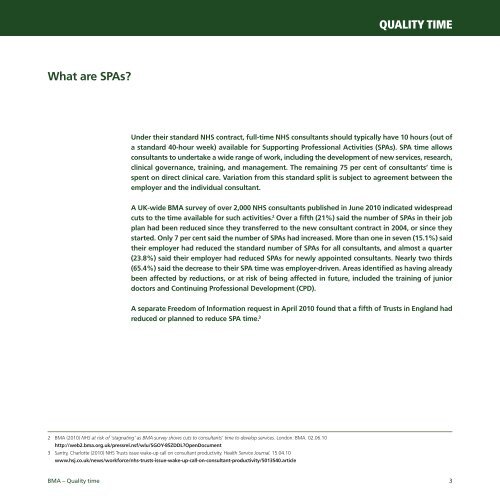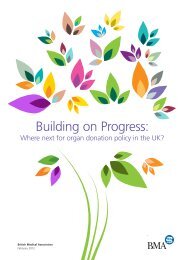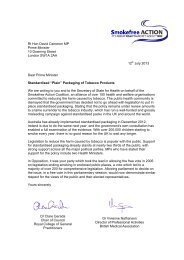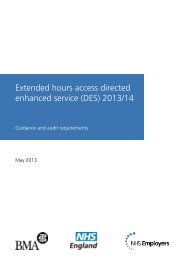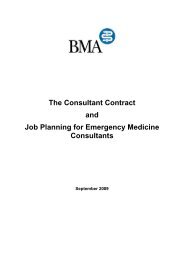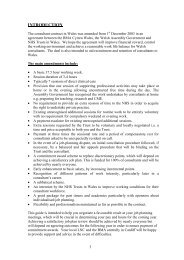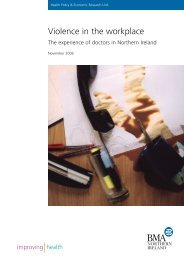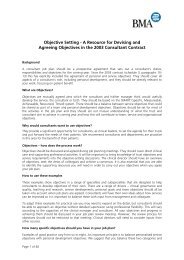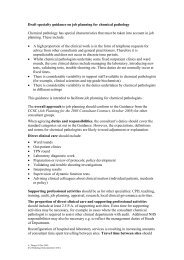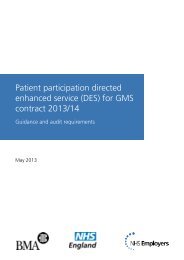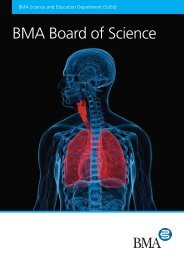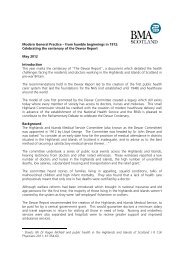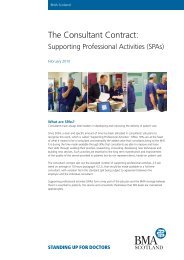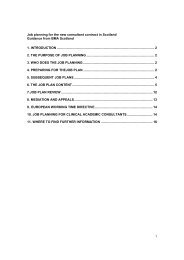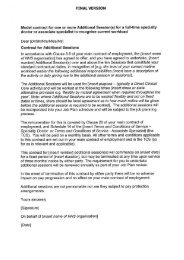Quality time: The value of consultants - BMA
Quality time: The value of consultants - BMA
Quality time: The value of consultants - BMA
You also want an ePaper? Increase the reach of your titles
YUMPU automatically turns print PDFs into web optimized ePapers that Google loves.
What are SPAs?<br />
2 <strong>BMA</strong> (2010) NHS at risk <strong>of</strong> ’stagnating‘ as <strong>BMA</strong> survey shows cuts to <strong>consultants</strong>’ <strong>time</strong> to develop services. London: <strong>BMA</strong>. 02.06.10<br />
http://web2.bma.org.uk/pressrel.nsf/wlu/SGOY-85ZDDL?OpenDocument<br />
3 Santry, Charlotte (2010) NHS Trusts issue wake-up call on consultant productivity. Health Service Journal. 15.04.10<br />
www.hsj.co.uk/news/workforce/nhs-trusts-issue-wake-up-call-on-consultant-productivity/5013540.article<br />
QUALITY TIME<br />
Under their standard NHS contract, full-<strong>time</strong> NHS <strong>consultants</strong> should typically have 10 hours (out <strong>of</strong><br />
a standard 40-hour week) available for Supporting Pr<strong>of</strong>essional Activities (SPAs). SPA <strong>time</strong> allows<br />
<strong>consultants</strong> to undertake a wide range <strong>of</strong> work, including the development <strong>of</strong> new services, research,<br />
clinical governance, training, and management. <strong>The</strong> remaining 75 per cent <strong>of</strong> <strong>consultants</strong>’ <strong>time</strong> is<br />
spent on direct clinical care. Variation from this standard split is subject to agreement between the<br />
employer and the individual consultant.<br />
A UK-wide <strong>BMA</strong> survey <strong>of</strong> over 2,000 NHS <strong>consultants</strong> published in June 2010 indicated widespread<br />
cuts to the <strong>time</strong> available for such activities. 2 Over a fifth (21%) said the number <strong>of</strong> SPAs in their job<br />
plan had been reduced since they transferred to the new consultant contract in 2004, or since they<br />
started. Only 7 per cent said the number <strong>of</strong> SPAs had increased. More than one in seven (15.1%) said<br />
their employer had reduced the standard number <strong>of</strong> SPAs for all <strong>consultants</strong>, and almost a quarter<br />
(23.8%) said their employer had reduced SPAs for newly appointed <strong>consultants</strong>. Nearly two thirds<br />
(65.4%) said the decrease to their SPA <strong>time</strong> was employer-driven. Areas identified as having already<br />
been affected by reductions, or at risk <strong>of</strong> being affected in future, included the training <strong>of</strong> junior<br />
doctors and Continuing Pr<strong>of</strong>essional Development (CPD).<br />
A separate Freedom <strong>of</strong> Information request in April 2010 found that a fifth <strong>of</strong> Trusts in England had<br />
reduced or planned to reduce SPA <strong>time</strong>. 3<br />
<strong>BMA</strong> – <strong>Quality</strong> <strong>time</strong> 3


